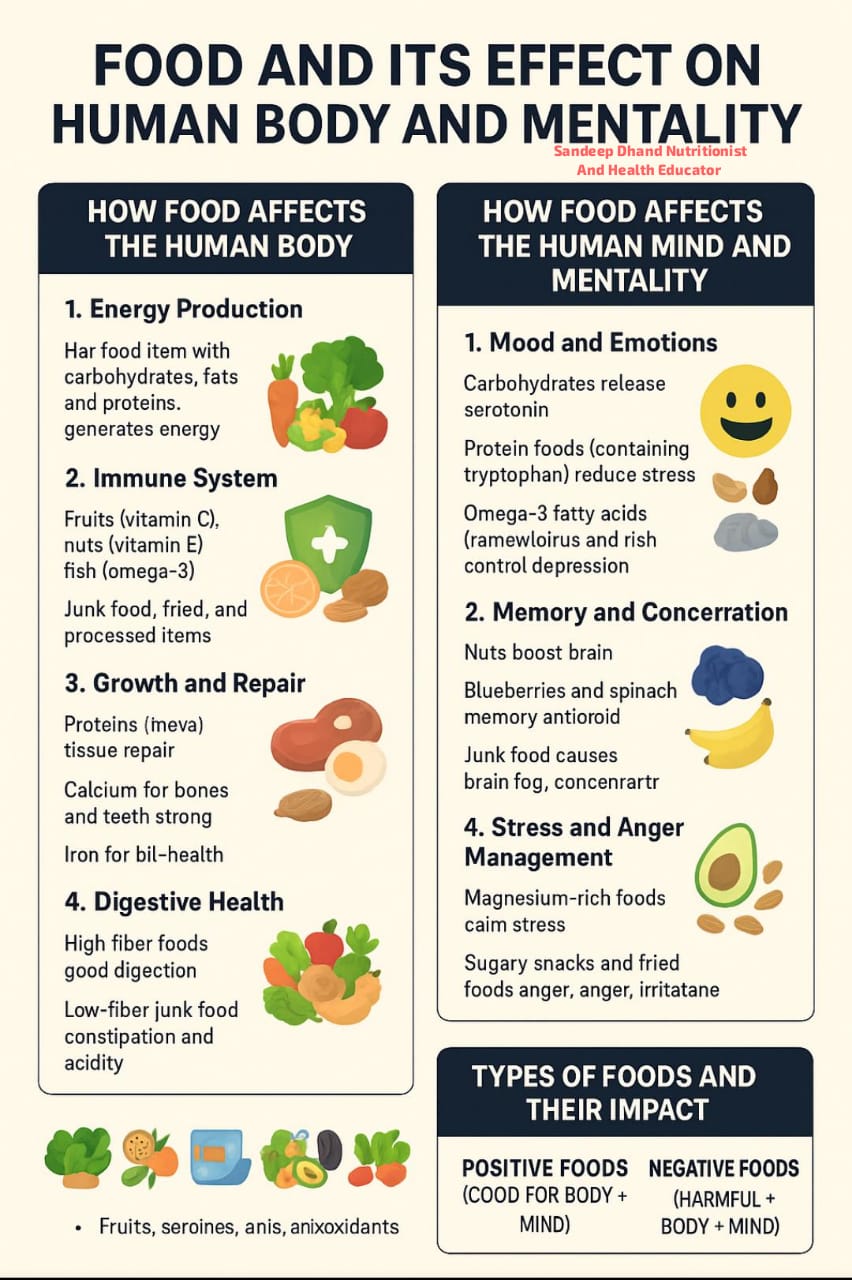Sandeep Dhand
Nutritionist And Health Educator
Introduction
Food is much more than just fuel for the body. It is medicine, energy, and the foundation of both physical and mental health. The meals we eat every day do not only provide calories but also influence our mood, emotions, memory, and overall behavior. Modern science and ancient Ayurveda both emphasize the same truth: “As you eat, so you think and live.”

This means that the food choices we make shape not just our bodies but also our thoughts, happiness, and ability to handle stress. Understanding the connection between food and health allows us to choose wisely, live in balance, and prevent many lifestyle disorders.
In this article, we will explore how food impacts the human body, how it affects the mind, the role of nutrition in mood and emotions, and the importance of balanced eating patterns.
How Food Affects the Human Body

- Energy Production
Every cell in the body needs energy to function. Food provides this energy through carbohydrates, fats, and proteins.
Healthy foods like fruits, vegetables, and whole grains provide clean energy. They release glucose slowly into the blood, giving us stamina throughout the day.
Unhealthy foods like fast food, fried snacks, and sugary drinks give instant energy but soon create a crash, leaving the body tired, lethargic, and lazy.
Example: Eating a bowl of oatmeal with fruits in the morning gives steady energy for work, while drinking a sugary cola may give a quick boost but soon causes fatigue.
- Immune System
Food is directly linked to the strength of our immune system. A strong immunity protects us from infections and diseases.
Immunity-boosting foods:
Fruits rich in Vitamin C (orange, guava, amla).
Nuts and seeds with Vitamin E.
Fish and flaxseeds rich in Omega-3 fatty acids.
Foods that weaken immunity:
Junk food, fried items, and processed snacks that increase inflammation in the body.
Regular consumption of fresh and natural foods helps the body fight viruses, bacteria, and long-term illnesses.
- Growth and Repair
Food is essential for growth and repair of tissues.
Proteins from dal, paneer, chicken, eggs, and soybeans help repair damaged tissues and build muscles.
Calcium-rich foods like milk, curd, and leafy greens keep bones and teeth strong.
Iron from spinach, jaggery, and meat keeps the blood healthy and prevents anemia.
Without these nutrients, the body becomes weak, and healing slows down.
- Digestive Health
Digestion plays a central role in overall wellness. If digestion is poor, the entire body suffers.
High-fiber foods like oats, fruits, vegetables, and whole wheat keep digestion smooth and prevent constipation.
Low-fiber junk foods cause acidity, bloating, and irregular bowel movements.
A healthy gut also improves mood, as modern research shows strong links between gut health and mental health.
How Food Affects the Human Mind and Mentality
- Mood and Emotions
Food influences the release of brain chemicals, also called neurotransmitters, which control mood and emotions.
Carbohydrates help release serotonin, known as the “happy hormone.”
Proteins with tryptophan reduce stress and promote calmness.
Omega-3 fatty acids in walnuts, flaxseeds, and fish reduce depression and anxiety.
Eating wholesome food daily makes a person more stable and cheerful. On the other hand, excessive junk and sugar cause mood swings and irritability.
- Memory and Concentration
Certain foods directly improve brain power.
Nuts (almonds, walnuts) sharpen memory.
Blueberries and spinach are rich in antioxidants that protect brain cells.
Junk food increases brain fog, making concentration weak.
Students who eat a balanced diet perform better in studies than those who depend on fast food.
- Sleep and Relaxation
Food also affects sleep quality.
Warm milk, bananas, and oats increase melatonin, a hormone that promotes sleep.
Tea, coffee, and cola contain caffeine, which disturbs sleep and leads to restlessness.
A light dinner and a glass of milk before bedtime are traditional but scientifically proven practices for better sleep.
- Stress and Anger Management
Stress and anger can be managed better with the right food.
Magnesium-rich foods like pumpkin seeds, spinach, and avocados relax the nervous system.
Sugary and fried foods worsen anger and irritability.
This is why people often feel more frustrated when their diet is poor and calm when eating healthy.
Types of Foods and Their Impact
- Positive Foods (Good for Body and Mind)
Fruits and vegetables: Packed with vitamins, minerals, and antioxidants.
Whole grains: Provide long-lasting energy without sudden sugar crashes.
Legumes, pulses, nuts: Good source of protein and brain health.
Fermented foods (curd, buttermilk, idli, dosa): Support gut health and emotional balance.
- Negative Foods (Harmful for Body and Mind)
Junk food (pizza, burger, samosa): Leads to obesity and mood swings.
Sugary drinks: Cause quick energy but later fatigue.
Too much fried/oily food: Promotes stress and laziness.
Alcohol and smoking: Damage liver, weaken immunity, and create mental depression.
Scientific Proofs
Harvard University study: People with a balanced diet were 30% less likely to suffer from depression.
WHO report: Junk food in children is linked with hyperactivity and aggression.
Ayurveda: Recommends “Satvik food” (fruits, vegetables, milk) for a calm and peaceful mind.
Nutrition Value of Different Foods
Here are some examples of nutrition values per 100 grams:
Fruits
Apple: 52 kcal, Vitamin C, fiber.
Banana: 89 kcal, potassium, Vitamin B6.
Orange: 47 kcal, Vitamin C, folate.
Vegetables
Spinach: 23 kcal, iron, calcium.
Carrot: 41 kcal, Vitamin A.
Broccoli: 34 kcal, Vitamin C, Vitamin K, fiber.
Grains
Brown rice: 111 kcal, fiber, magnesium.
Oats: 68 kcal, soluble fiber.
Whole wheat roti: 120 kcal, complex carbs.
Proteins
Dal: 116 kcal, protein, folate.
Paneer: 265 kcal, protein, calcium.
Egg: 155 kcal, high-quality protein.
Nuts & Seeds
Almond: 576 kcal, Vitamin E.
Walnut: 654 kcal, Omega-3.
Flaxseed: 534 kcal, fiber, Omega-3.
Drinks
Milk: 42 kcal (per 100 ml), calcium, protein.
Buttermilk: 40 kcal, probiotics.
Coconut water: 19 kcal, potassium.
Food Patterns for a Healthy Body and Mind
Morning: Warm water with lemon (detox), oats with fruits and nuts (energy and mood boost).
Lunch: Whole wheat roti, dal, seasonal vegetable, salad, and curd (balanced nutrition).
Evening Snack: Fruits like banana or apple instead of fried snacks, green tea for relaxation.
Dinner: Light food such as khichdi, soup, or vegetable dal, followed by warm milk for better sleep.
Food and Mental Disorders
Depression: Omega-3, Vitamin D, and B-complex rich diets improve mood.
Anxiety: Magnesium and tryptophan (nuts, seeds, bananas) provide calmness.
Anger and Aggression: Avoid caffeine, alcohol, and sugar.
ADHD (children): Avoid artificial colors and processed food; give natural fruits and vegetables.
Practical Tips
- Eat more Satvik foods – fresh fruits, vegetables, milk, and nuts.
- Stay hydrated – water improves mental clarity.
- Limit junk food – enjoy it occasionally, not daily.
- Practice mindful eating – eat in a relaxed state, not under stress.
- Maintain balance – every nutrient is important in the right amount.
Conclusion
Food is life. It not only gives us physical strength but also provides mental stability, happiness, stress control, and emotional balance. A healthy diet builds a healthy body and a peaceful mind, while junk food creates a weak body and a disturbed mind.
Choosing the right food is the simplest yet most powerful step we can take toward a healthier, happier, and more meaningful life.



